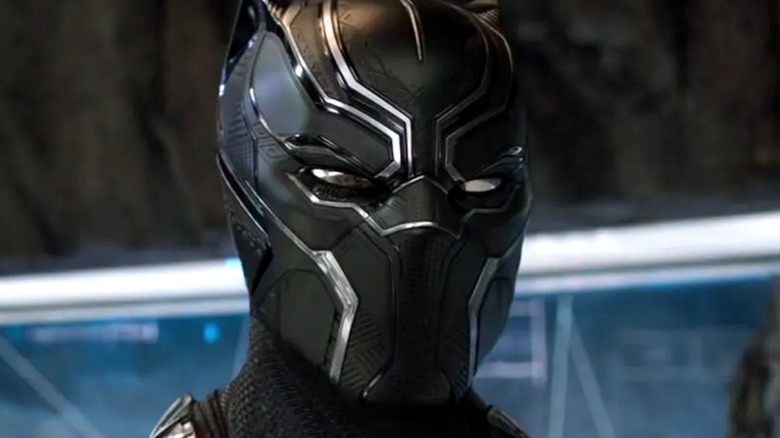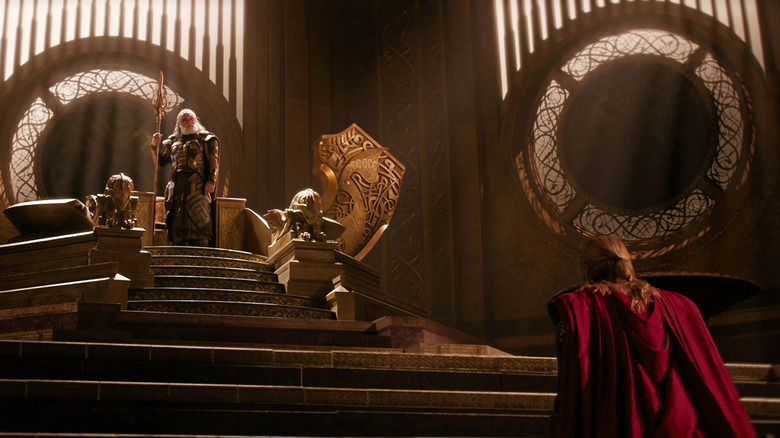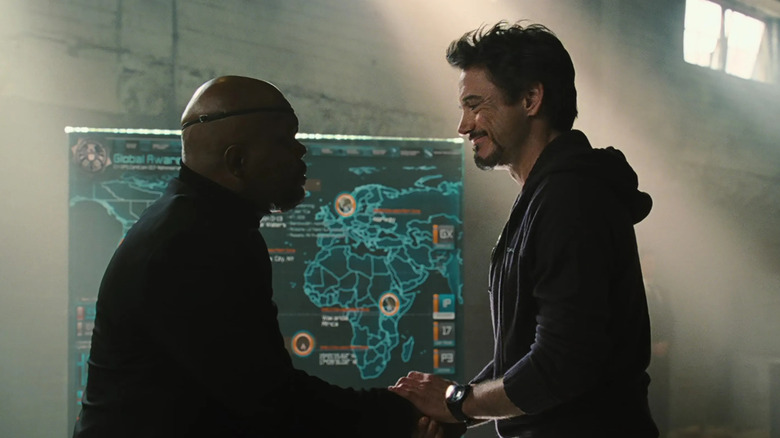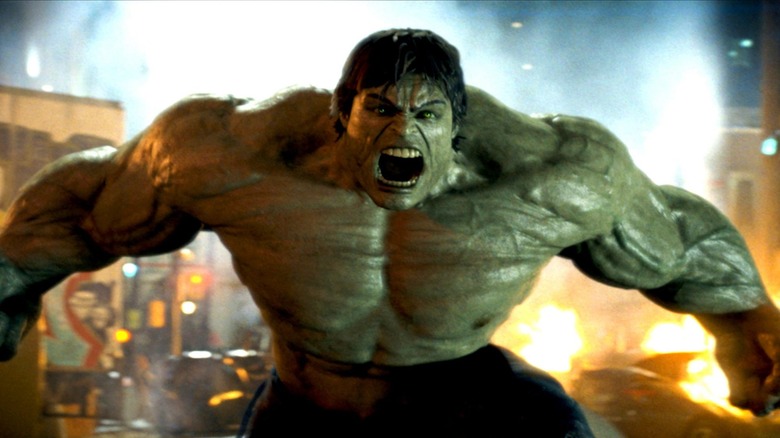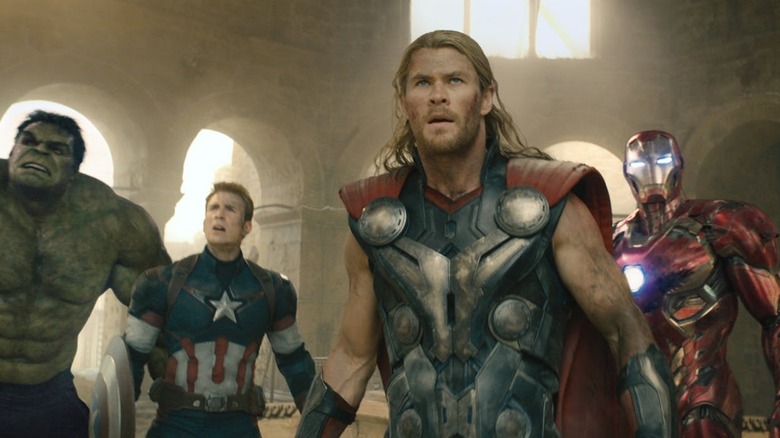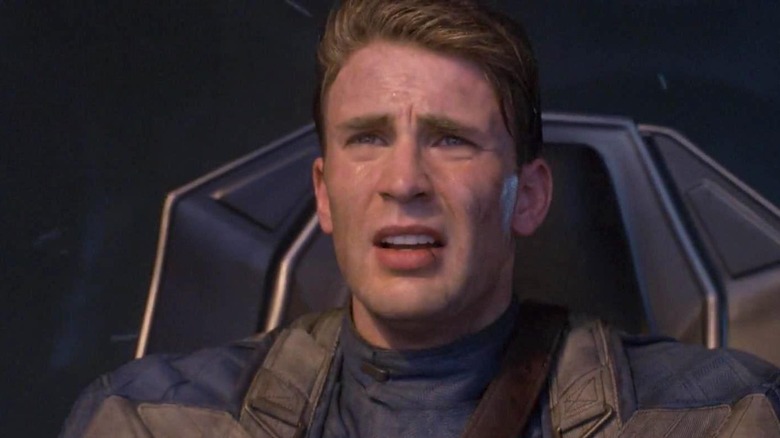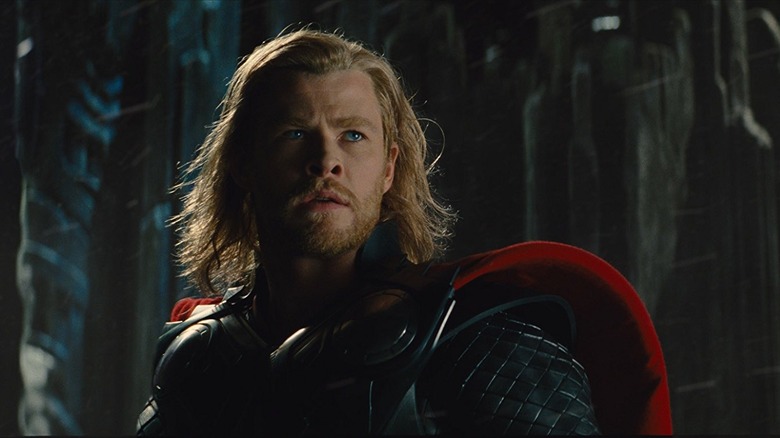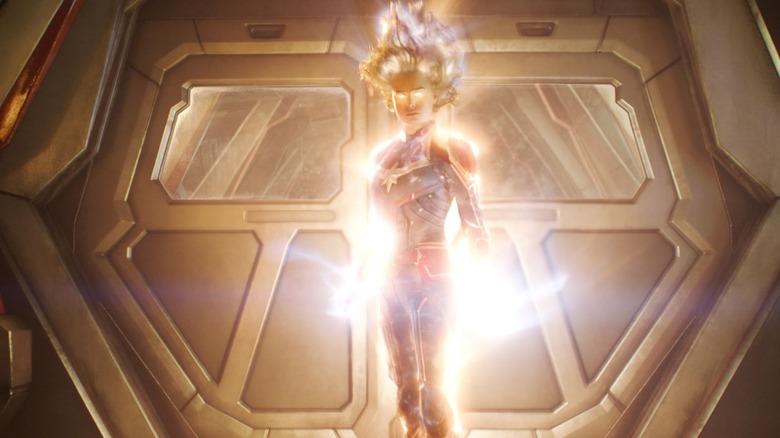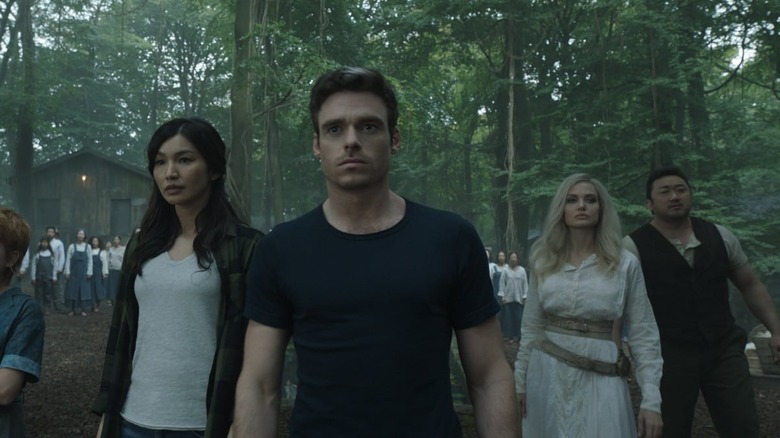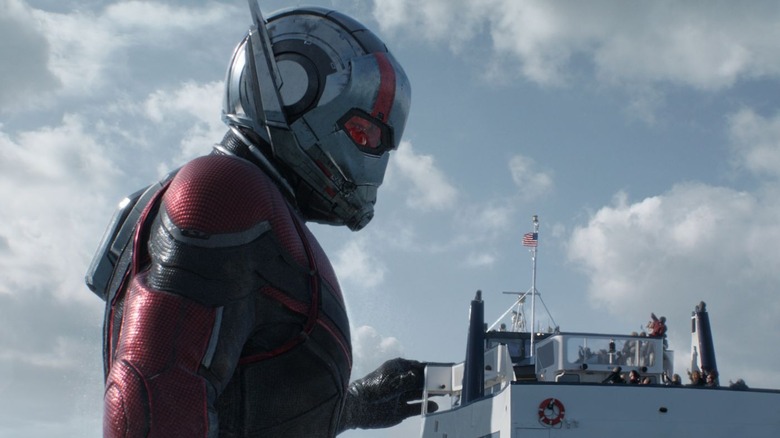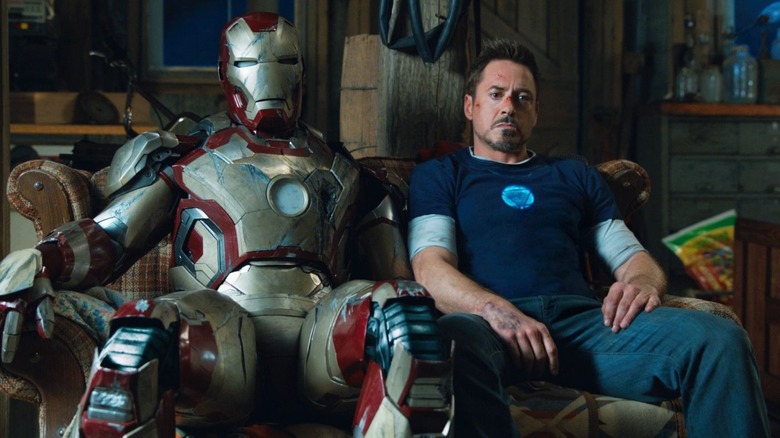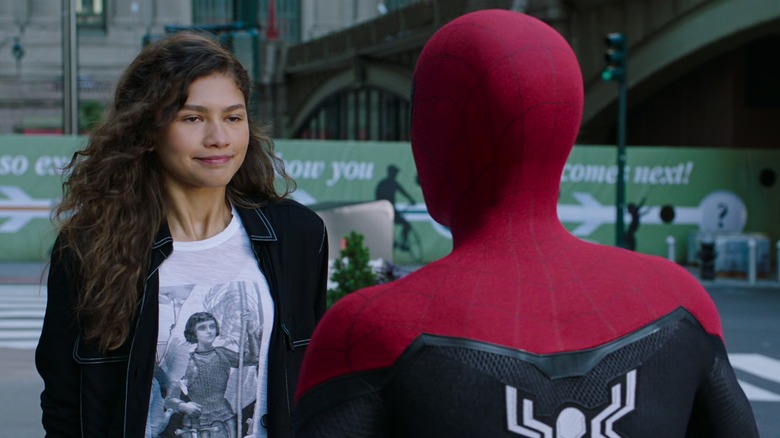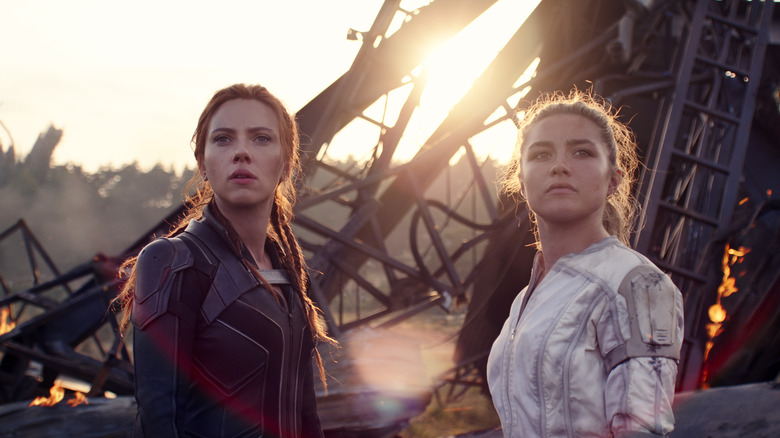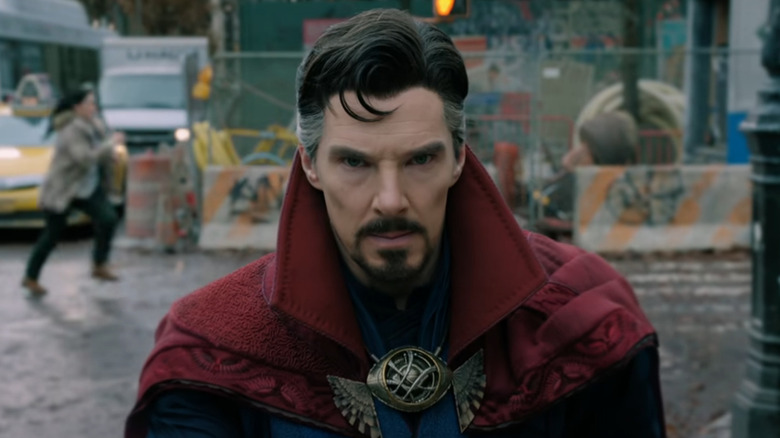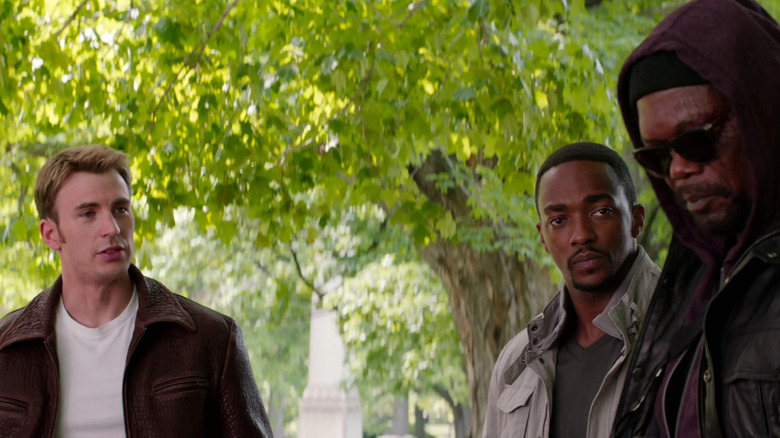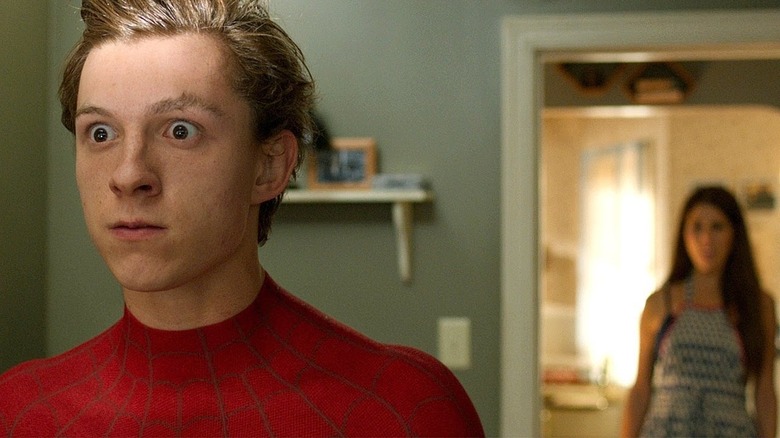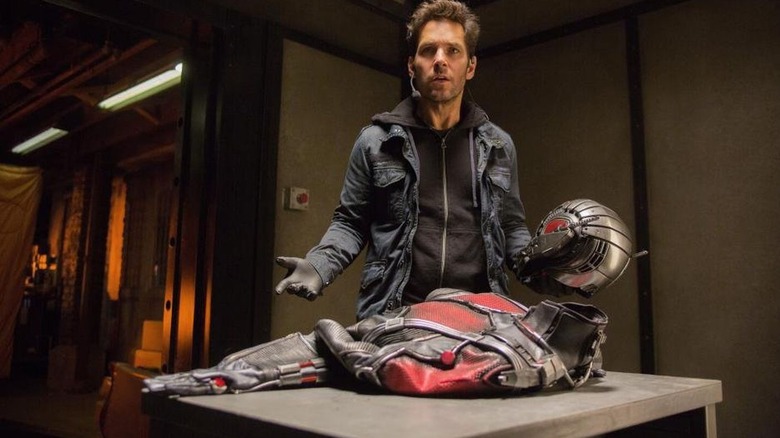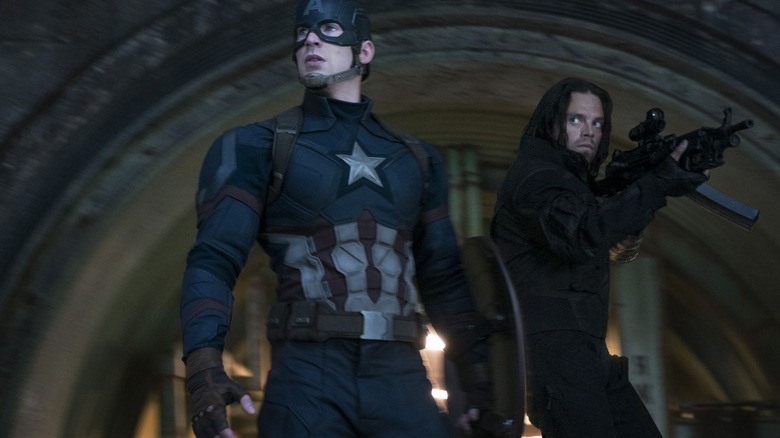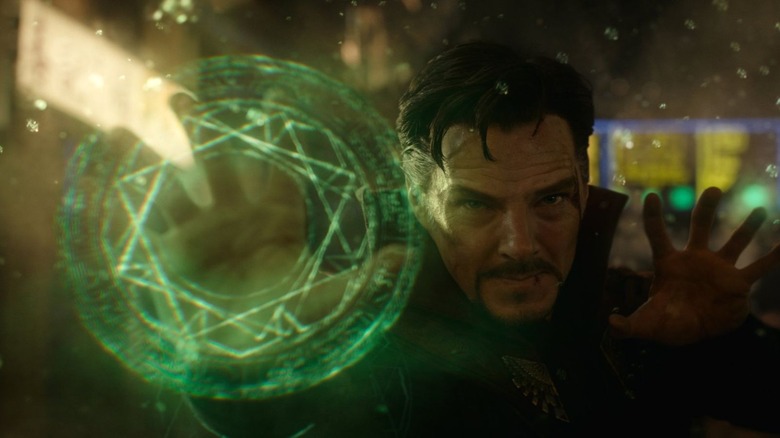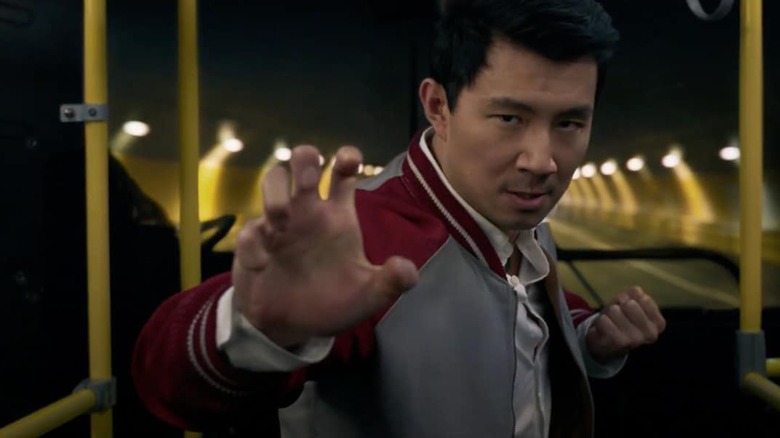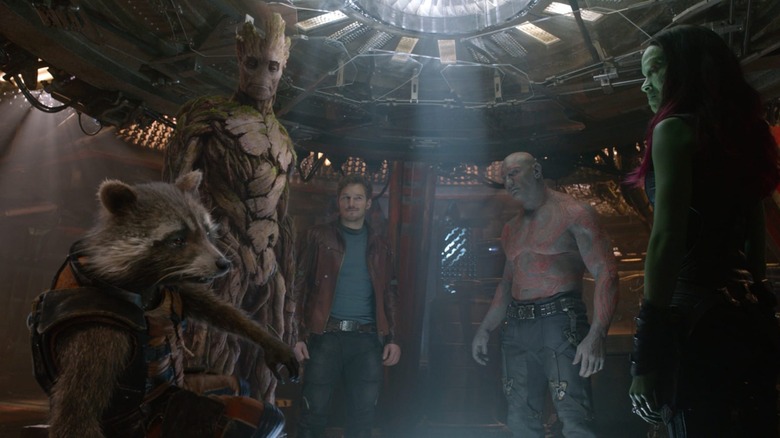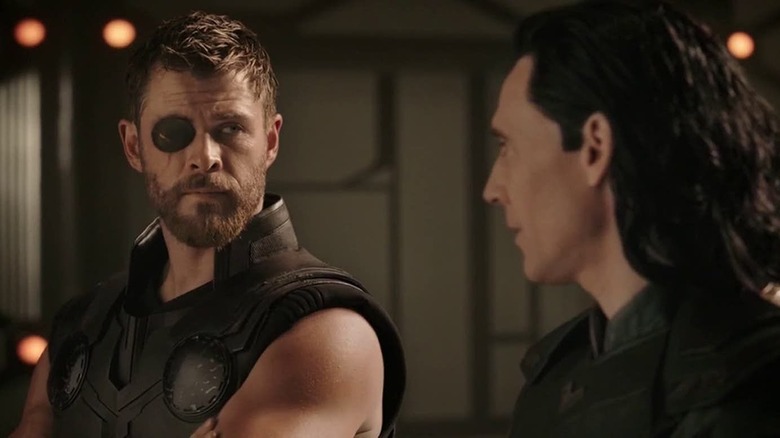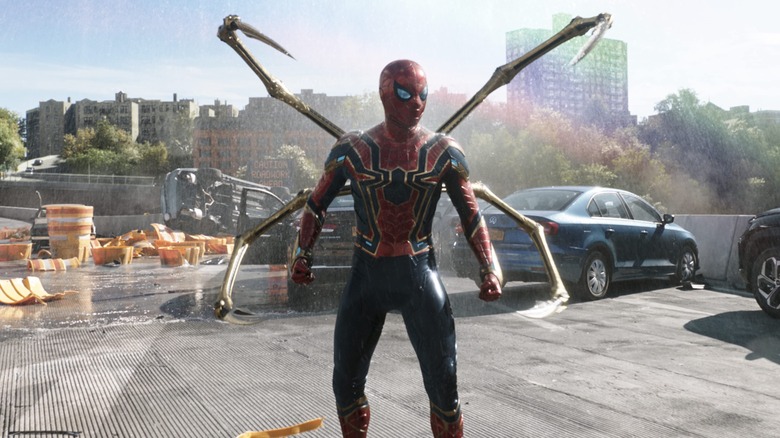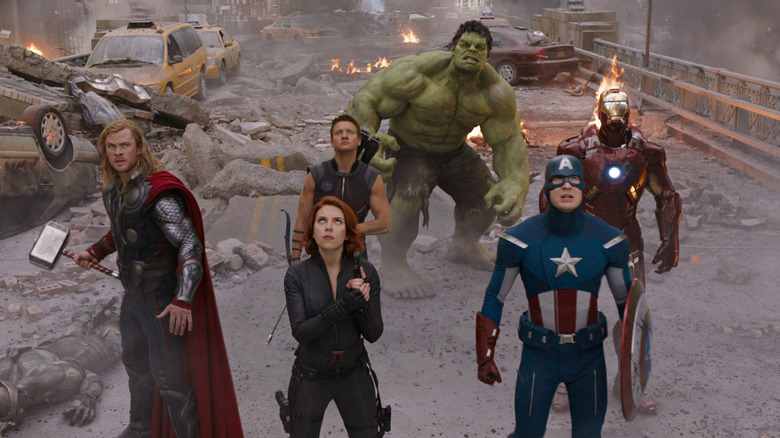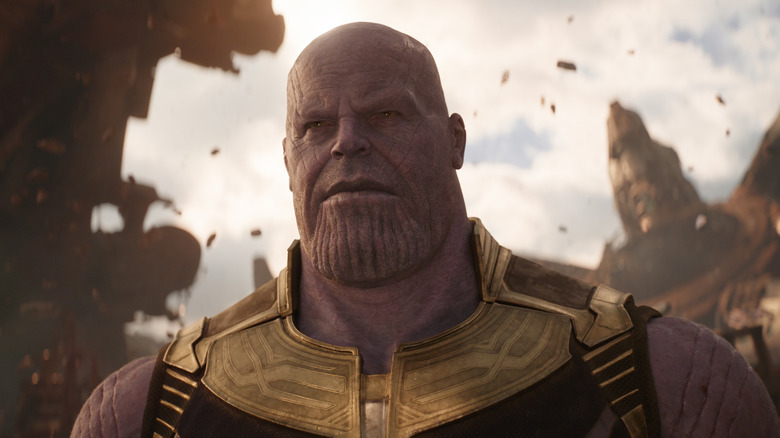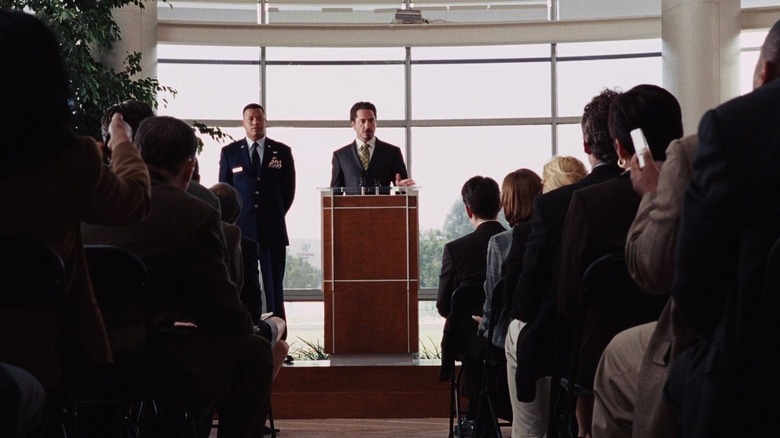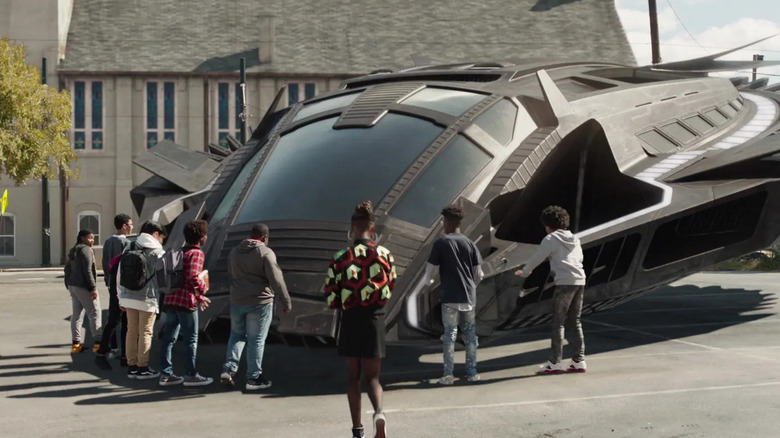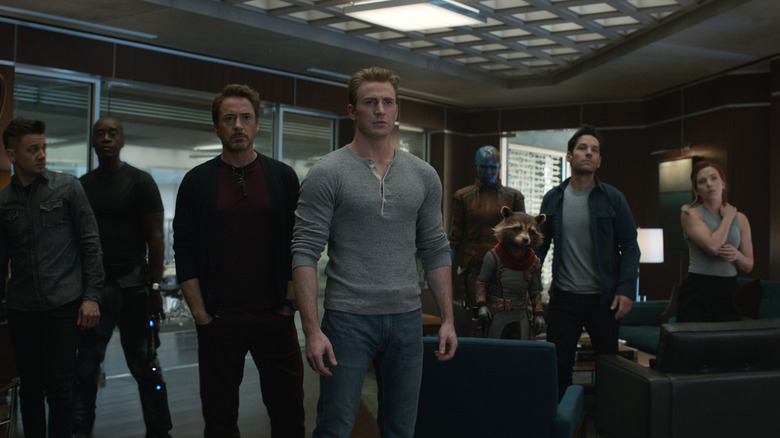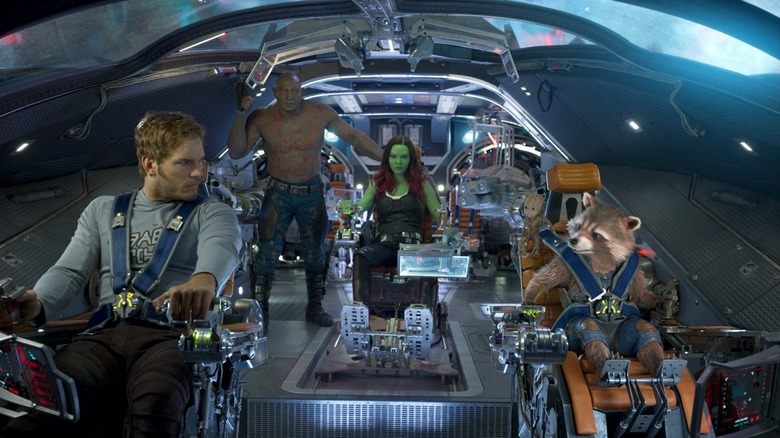Ranking Every MCU Movie's Ending Scene Worst To Best
Everybody always talks about the post-credit scenes of Marvel Cinematic Universe movies, and for good reason — they can be quite exciting. However, before those segments fill up the big screen, there are the proper endings to the Marvel Cinematic Universe installment that people just finished watching.
In those final scenes before the credits begin to roll, the various endings of the Marvel Cinematic Universe also tend to tease future installments through pieces of dialogue, bombshell twists, or even just surprise appearances from important supporting characters. More importantly, though, they can help provide welcome closure to a standalone story through tears, laughter, and every emotion in between. The best of these endings remind you why you fell in love with characters like Black Panther and Captain America in the first place — even if not every ending in this expansive franchise has managed to stick the landing.
Throughout the various entries in the MCU, there has been a fair share of underwhelming endings. These unsatisfactory conclusions are more apparent than ever when ranking the various MCU movie endings from worst to best. Luckily, the finer details of the endings that knock your socks off also become equally prominent. Whether good or bad, though, looking over the Marvel Cinematic Universe endings allows one to appreciate the final moments in these films before the post-credit sequences grab all the oxygen in the room.
28. Thor: The Dark World
It almost doesn't feel fair to put "Thor: The Dark World" at the bottom of yet another MCU ranking, but the ending to this one is, unfortunately, underwhelming. Concluding with Thor (Chris Hemsworth) and Odin (Anthony Hopkins) having a father/son talk about how Thor no longer yearns for the throne, the conversation is stagnantly shot by director Alan Taylor and lacks much visual imagination. That alone is enough to make this an underwhelming finale, but restricting this ending to just Asgard means viewers don't get any closure on key human allies, like Jane Foster (Natalie Portman), from the preceding film.
Adding insult to injury is how such a resolution does exist in "Thor: The Dark World," it's just nestled at the very end of the credits. Thor and Foster get a final smooch and reunion on Earth, just not in the proper ending to the movie. Instead, the last moments before the credits roll are dedicated to Loki (Tom Hiddleston). Previously thought to have died fighting the Dark Elves with Thor, he reveals that he's taken over Odin's identity once Thor has left the room. It's nice to get some reassurance that fans will see more Loki in the future, but the ending of "Thor: The Dark World" should've focused on wrapping up emotional threads in its own movie instead of doling out teases for more Thor solo outings.
27. Iron Man 2
A lot of "Iron Man 2" has had the unfortunate effect of feeling like little more than a set-up for later Marvel Cinematic Universe entries. That continues to the film's ending, which kicks off with a meeting between Nick Fury (Samuel L. Jackson) and Tony Stark (Robert Downey Jr.) that involves Fury informing Stark that he no longer wants him on the Avengers. After this exchange, Fury pulls some strings to get the antagonistic Senator Stern (Garry Shandling) to present Stark and Rhodes (Don Cheadle) with their medals for saving the world in the preceding scenes of "Iron Man 2."
The conversation between Fury and Stark is awkward, right down to the flat set that it's shot in. It doesn't connect with the preceding movie's core themes and mostly comes off as a shoehorned trailer for "The Avengers." The pay-off gag with Shandling's character is fun, but it goes on a bit long and doesn't work well placed against the preceding conversation. This underwhelming ending is a microcosm of "Iron Man 2" in how it's disjointed and derailed by the set-up for future MCU titles.
26. The Incredible Hulk
The ending to "The Incredible Hulk" see's Bruce Banner (Edward Norton) isolated from the world once again. Things come full circle from the opening sequences of Banner hiding in South America, as the character is now hiding out in British Columbia. Living in a cabin off the map, Banner is shown meditating, seemingly in a state of contentment — only for his heart rate to suddenly get faster and faster. After a moment, Banner's eyes turn green, indicating he's about to transform into The Hulk, and then a grin flashes on his face. The man who used to fear the monster inside of him now has a drastically different response.
While not a bad conclusion per se, and it's commendable that the film tried for an ambiguous finish, the ending for "The Incredible Hulk" doesn't quite tug at the heartstrings or excite the senses as it should. It's a bit flat visually and even repetitive thematically since the viewer already saw Banner embrace his inner monster in a climactic showdown with the Abomination. Ultimately, this ending fails to add anything super special to the plot or prove captivating on its own merits, and that keeps "The Incredible Hulk" from being a notable entry in the pantheon of MCU endings.
25. Avengers: Age of Ultron
The ending of "Avengers: Age of Ultron" can't help but pale compared to the conclusions of the other three "Avengers" titles. Every other "Avengers" installment ends on a note that suggests that the Marvel Cinematic Universe will never be the same, sometimes for the better, such as "Avengers: Endgame," other times for the uncertain worse, such as "Avengers: Infinity War." By contrast, "Age of Ultron's" ending's biggest deviation from the norm is showing that the titular superhero group has shifted its headquarters from Stark Tower to a larger compound in upstate New York.
Otherwise, there's a strange sense of stagnation here. Even the depiction of Hawkeye (Jeremy Renner) eschewing superhero antics to spend time with his family feels too detached in execution to leave an impact. There are some funny lines, but the ending doesn't suggest that the horrors delivered by the robot Ultron or the challenges experienced by the main Avengers will have much in the way of lasting ramifications. Even a depiction of a new Avengers line-up doesn't inspire strong emotions beyond making one wonder why Sam Wilson, aka the Falcon (Anthony Mackie), couldn't have been part of the Avengers roster in the rest of "Age of Ultron." Even without comparing it to its predecessor and successors, the ending of "Age of Ultron" is too familiar for its own good.
24. Captain America: The First Avenger
The ending of "Captain America: The First Avenger" is a strange beast, namely in how it's not a bad sequence on its own merits. After Steve Rogers (Chris Evans) throws himself into the ice to save the world in World War 2, he awakens in a hospital bed in what seems like it's still the 1940s — but something's off. A baseball game on the radio is one that Rogers had attended in-person years earlier. Suspecting something screwy is going on, Rogers bursts out of the room he's being confined in only to realize he's in a SHIELD base in the modern world. Nick Fury then shows up to explain that Rogers has been asleep for 70 years, only for this superhero to suddenly remember his lover, Peggy Carter (Hayley Atwell), once he recalls that he's "late for a dance."
It's a touching depiction of a seemingly impervious man finding himself bending to the will of time. Unfortunately, it feels too much like a mid-credits scene, not a proper ending for a standalone feature. The unique period piece backdrop of "Captain America: The First Avenger" has been tossed away at the last possible minute for a more generic modern-day setting, all in the name of teeing up future MCU adventures. A scene this effective deserves better than serving as the tacked-on ending to "Captain America: The First Avenger."
23. Thor
The original "Thor" concludes with the Rainbow Bridge, which allowed Asgardians to travel to other realms, shattered. Above all else, this means that Thor will no longer be able to trek to his Earthbound love interest, Jane Foster. But as Thor looks on his kingdom with his friends and family, Foster is busy with her Earth colleagues working on some kind of device. Per the Asgardian Heimdall (Idris Elba), Foster is determined to see Thor again, which would explain her recent scientific excursions. In the movie's final shot (before the post-credits scene, of course), Thor emits a grin, knowing that, with the wits of Foster, he will see her again. It's a cute enough ending that nicely caps off the unexpectedly charming romance that became a critical part of Thor's inaugural solo cinematic outing.
However, the rush to reassure Thor and audiences that Jane Foster isn't too far away does rob some of the power of Thor's sacrifice in destroying the Rainbow Bridge. What was previously a massive stunt to demonstrate that the God of Thunder had grown more selfless is now mitigated in the hopes of providing a tidier happy ending. Saving that resolution for a later Marvel Cinematic Universe outing would've done the conclusion to "Thor" so much good, even if the cute romantic vibes of this final ending are far from torturous.
22. Captain Marvel
"Captain Marvel" is another instance of a Marvel Cinematic Universe movie whose ending would have worked much better as a mid-credits scene. After the titular superhero blasts off into space, the camera returns to Earth, where Nick Fury is hard at work on a computer. After a brief chat regarding a potential eyepatch that Fury could now wear, the duo realizes that the galaxy is filled with more threats than they could ever imagine. They need heroes. That's when Fury gets an idea.
After looking at a photo of Carol Danvers (Brie Larson) standing next to her jet named Avenger, Fury realizes the perfect name for a potential superhero group. It's a cutesy way of tying in this character into the larger history of the Avengers, but it also feels like too much world-building rather than being firmly rooted in this standalone adventure. As a mid-credits teaser, it would be sufficient. As the proper ending to a film, though, "Captain Marvel" doesn't quite go higher, further, or faster.
21. Eternals
The final scene of "Eternals" starts grounded, as Sersi (Gemma Chan) talks to her boyfriend, Dane Whitman (Kit Harington), about her adventures while this seemingly ordinary guy hints at his Black Knight superhero persona. However, their conversation gets interrupted when the Celestial Arishm arrives over Earth and plucks up Earthbound Eternals Sersi, Phastos (Brian Tyree Henry), and Kingo (Kumail Nanjiani). This cosmic being proceeds to inform them that they will all be judged for their involvement in sabotaging the birth of a Celestial in the Earth's core, with Arishm then whisking the trio away to an unknown spot in space.
It's a gonzo ending on paper, but unfortunately, it feels too much like a tease for further "Eternals" movies rather than a satisfying conclusion to this story. The best parts of "Eternals" have roots in the film's standalone qualities that thrive in the here-and-now. This ending, unfortunately, primarily functions as a teaser trailer for a prospective "Eternals 2." It doesn't help that director Chloe Zhao divulged information to Empire about a substantially darker, but also bolder, ending that was filmed but never used. Being conscious of a better alternative for how "Eternals" could've wrapped up only exacerbates the disappointing nature of its eventual conclusion.
20. Ant-Man and the Wasp
Some Marvel Cinematic Universe endings miss the mark by a country mile, while others feel downright unforgettable. Then there's the ending to "Ant-Man and the Wasp," which is mostly just pleasant rather than extraordinary.
The scene revolves around a drive-in movie night with Scott Lang (Paul Rudd), Hope van Dyne (Evangeline Lilly), and Cassie Lang (Abby Ryder Fortson), with the final gag being that they're in miniature form watching the film from a toy car. It's a cute joke that throws out one final size-based visual gag before the credits roll. This final moment of levity won't have you grabbing your sides, but it's amusing enough and ends "Ant-Man and the Wasp" laser-focused on its central trip. Plus, the scene gets bonus points for focusing on individuals and gags specific to this movie rather than busying itself with set-up for future films. Sometimes, all you need is to be pleasant.
19. Iron Man 3
"Iron Man 3" deserves more love in the larger Marvel Cinematic Universe discourse, though it isn't without shortcomings. Case in point: the film's ending.
This conclusion sees Tony Stark narrating a series of events that occurred in the wake of this superhero saving the day. Bad guys get arrested, a small boy from Oklahoma gets a lavish workshop to enjoy, and Stark recovers whatever's survived from his decimated home. Oh, and Stark gets the shrapnel removed from his chest thanks to some new medical technology used in precision surgery. There are fun beats here, but it's all a bit forced. There are some pivotal character beats here that needed more room to breathe, not getting barreled through in a single montage.
Most notably, Stark opting to remove the shrapnel in his chest feels especially rushed with little prior set-up over why he'd do this now. The overall narrative of "Iron Man 3" is often quite creative and enjoyable, making this rushed ending feel more underwhelming by comparison.
18. Spider-Man: Far From Home
After returning home from his European showdown with Mysterio, this version of Spider-Man (Tom Holland) decides to lean into MJ (Zendaya) learning his secret identity in the ending of "Spider-Man: Far From Home." This comes in the form of him taking her on a spin across the skyline of New York City, a whip-fast trip that ends up causing MJ to scream in terror. Who wouldn't be petrified being so far up from the ground clinging to Spider-Man?
This cute romantic moment to close out "Spider-Man: Far From Home" reinforces the film's focus on relationships as the most important part of Spider-Man's life. If there's one drawback to this capper, though, it's that its imagery feels too derivative of similar web-aligning scenes from previous incarnations of this same character. Plus, the movie's mid-credits scene directly following up on this ends up blowing away that moment of romantic connection. Still, that shouldn't take away from the fun pleasures of this scene, especially the enjoyable performance of Zendaya depicting MJ in a state of chaotic terror.
17. Black Widow
In the final moments of "Black Widow," the audience gets to see the titular superhero heading off to her adventures in "Avengers: Infinity War," complete with the blonde hairdo she'd sport in that film. This scene also explains how Natasha Romanoff (Scarlett Johansson) and her fellow fugitive superheroes managed to secure a Quinjet in that sequel, with "Black Widow" concluding with this Avenger soaring off into the sky to help her friends. As the Quinjet vanishes from sight, the camera moves down to linger on some lightning bugs flying against a night sky, an image harkening back to the opening shots of "Black Widow."
The way director Cate Shortland attempts to provide a tidy bookend for "Black Widow" is admirable, but the conclusion here feels torn between two masters. On the one hand, the final visual attempts to provide unity across "Black Widow" as a narrative, but this scene itself only exists to set up "Avengers: Infinity War." Missing are the many endearing supporting characters from the rest of the film's runtime, like Yelena, and the ending fails to provide a real resolution for the preceding scene hinting at a confrontation between Romanoff and General Ross (William Hurt). While not a bad ending, the final moments of "Black Widow" can't help but come off as an awkward attempt to do so much in one scene.
16. Doctor Strange in the Multiverse of Madness
After all the lunacy of "Doctor Strange in the Multiverse of Madness," the movie's ending initially appears to be a much-needed respite, with Doctor Strange and Sorcerer Supreme Wong overseeing the reconstruction of Kamar-Taj while America Chavez starts to learn the mystic arts. There are some small moments of emotional bonding between these individual heroes before Strange, in an indication of how he's letting go of the past, fixes his shattered watch. It's a new day and Strange is shown emerging from the Sanctum Sanctorum ready to embrace it. Unfortunately, just as he's strolling down a New York City sidewalk, Strange falls to his knees and begins to scream as a third eye emerges on the top of his forehead — possibly a byproduct of him using the Darkhold to save the world.
The most delightful part of the "Multiverse of Madness" ending is that it feels right at home with the kind of movies the rest of the film pays tribute to. This is an ominous cliffhanger with horror undertones that promises Doctor Strange's journey is far from over. It's not even that far off from the endings in director Sam Raimi's original "Evil Dead" movies. The quiet emotional beats aren't quite as satisfying as this final scary jolt, but they serve their function in wrapping up this chapter of Doctor Strange's life.
15. Captain America: The Winter Soldier
The first "Captain America: The First Avenger" sequel rounds off its story with Steve Rogers, Sam Wilson, and Nick Fury paying a visit to the grave of — Nick Fury. The former director of SHIELD is going underground and will need the world to think he's dead to do that. This development already helps this ending move up a few slots on this list thanks to Fury's grave featuring the epitaph "the path of the righteous man: Ezekiel 25:17," a reference to a quote delivered by Samuel L. Jackson in "Pulp Fiction." After Fury is gone, Natasha Romanoff and Rogers have one final goodbye before the latter character and Wilson, using intel about Bucky Barnes handed to them by Romanoff, prepare to track down the man brainwashed to serve as the Winter Soldier.
The scene isn't especially compelling visually and feels a touch too much like a cliffhanger for future movies. However, the restrained nature of this ending does allow the performances of actors like Chris Evans and Scarlett Johansson to take center stage, a welcome detail. It is also nice that it's a relatively serious scene that doesn't undercut the ramifications of the impactful climax of "Captain America: The Winter Soldier" with shoehorned-in jokes. Plus, given how much fun "The Winter Soldier" has been, it's hard to complain about getting an overt signal that more adventures in this style are on the way.
14. Spider-Man: Homecoming
At first, it looks like "Spider-Man: Homecoming" is headed towards a fine but not especially exceptional ending. The conclusion here kicks off with one final conversation between Peter Parker and Tony Stark that culminates in Gwyneth Paltrow appearing as Pepper Potts for the first time since "Iron Man 3." Her character's presence is always welcome, but her cameo feels tacked on and doesn't connect to Parker's journey.
Luckily, the very last moment of "Homecoming" involves Parker returning to his room and discovering a fresh new Spider-Man outfit on his bed. He tries it on in a triumphant moment, only for Marisa Tomei's Aunt May to walk in and discover that her nephew is Spider-Man. What starts as a genuinely moving reminder that Parker is coming into his own as a superhero morphs into a hysterical shake-up to the status quo of this character's home life. Ultimately, the ending of "Homecoming" overcomes an early over-reliance on fan service to deliver something that encapsulates the wry humor of the entire feature.
13. Ant-Man
Just as "Ant-Man" seems to be winding down, the film tosses off one more instance of Michael Pena's Luis recounting a story. The moment those drums begin rumbling, it's clear where the film is going next. After a false start, Luis recalls how none other than Sam Wilson is trying to track down Scott Lang after they skirmished earlier in the film. Lang had previously been working under the radar, and now, the Avengers were calling. No wonder Luis is so excited to recount this tale.
While this is a familiar gag, it's hard to complain about getting more Luis storytelling. Plus, the varied locations in this sequence and the presence of a Stan Lee cameo help to give it a unique personality. Additionally, this is one of the more enjoyable ways that an ending to an MCU title has directly connected to an upcoming movie in the franchise, as Wilson tracking down Lang lays the groundwork for "Captain America: Civil War."Beyond that, it also works nicely as a way to suggest this former burglar isn't finished with his superhero antics. Accomplishing a dual feat like that is how you score an ending as satisfying as this.
12. Captain America: Civil War
Given how many Earth-shattering developments and dramatic twists "Captain America: Civil War" delivered, it's no surprise that the film opted to end on a quieter note, one more about rumination than throwing in one more big explosion. Beginning with James "Rhodey" Rhodes getting used to his new legs and a quick shot of Vision (Paul Bettany) contemplating his place in the world while fiddling with a chess piece, the ending soon shows Tony Stark reading a letter from Steve Rogers. Rogers admits to Stark that he wishes things could be different but that he must fight for what he believes in. Should Stark ever need him, Rogers reassures him that he'll only be a phone call away, hence why a cell phone was delivered with the letter. At the same time, Rogers is shown to be breaking out the incarcerated Avengers, including Sam Wilson and Scott Lang, from the Triskelion prison.
Some fans have bristled at how this seems to suggest an easy resolution for the primary Stark and Rogers divide in the film. However, given that the Sokavia Accords are still in effect at the end of this feature, not to mention Rogers still being a fugitive, the ending functions nicely not as an abrupt wrap-up to interpersonal conflicts but as Rogers being true to himself by offering something resembling an olive branch. It's a nice intimate character beat to close out an expansive MCU installment.
11. Doctor Strange
"Doctor Strange" is one of the rare Marvel Cinematic Universe endings to largely eschew dialogue. This restrained conclusion comes after the titular lead of the film (Benedict Cumberbatch) saves the world through the use of the Time Stone and returns that same artifact for safekeeping. After these developments, Strange returns to the New York City Sanctum Sanctorum, which he will now oversee.
Walking to a large window on the top floor of this establishment, Strange removes a watch from his arm, a gift from former lover Dr. Palmer (Rachel McAdams), which demonstrates to the viewer that his hands are still shaking as a result of his accident. The camera pulls back to emphasize not just the empty space surrounding Strange but also the mystical wonders he now has in his everyday life. Without having this character say a word, the ending of "Doctor Strange" conveys the fact that one life has ended for this Avenger and another has begun.
It's a contemplative ending that proves quite affecting in the context of the journey Strange has gone on during this movie, with the poignancy of this moment exacerbated by the wise choice to eschew dialogue. The quiet physical acting from Cumberbatch also gets to shine in this ending, which turns out to be one of the more thoughtful and moving conclusions in the MCU canon.
10. Shang-Chi and the Legend of the Ten Rings
"Shang-Chi and the Legend of the Ten Rings" ends with Shang-Chi (Simu Liu) and Katy (Awkwafina) returning to talk with two of their pals from high school. As fans might expect, the conversation is dominated by Shang-Chi and Katy's recounting of all the extraordinary things that happened in this film's climactic battle scene. As one of the friends (played by Stephanie Hsu) protests that this whole thing was impossible, who should appear through a portal but Wong (Benedict Wong) calling out for Shang-Chi. After downing some drinks, Wong informs Shang-Chi that he and Katy need to come with him and bring the magical rings to deal with urgent business. As they follow Wong, Shang-Chi and Katy, who just a week ago seemed like aimless twenty-somethings, have now had their value and exciting future reaffirmed in public. How quickly things can change.
This ending to "Shang-Chi and the Legend of the Ten Rings" errs on the side of being a bit of a cliffhanger, but any excuse for more Wong is never a bad thing. Plus, it does provide a nice contrast to an earlier scene in the film that reinforced how Shang-Chi and Katy were struggling to find purpose in their respective lives. Thus, connecting to the grander MCU with this enjoyable ending does work, at least on one level, as solid standalone character work. This ending also gets bonus points for featuring an appearance from the always welcome Stephanie Hsu.
9. Guardians of the Galaxy
The original "Guardians of the Galaxy" is largely a raucous ride, but its ending begins with a touch of melancholy, as Peter Quill (Chris Pratt) finally opens the present his mom gave him on her deathbed. Reading the letter contained within, viewers learn that his mom is the reason Quill refers to himself as "Star-Lord," his outlaw moniker being a way to preserve a connection with his deceased parent. The gift she bestowed on him turns out to be a cassette tape entitled Awesome Mix Vol. 2, which features the Marvin Gaye and Tammi Terrell cover of "Ain't No Mountain High Enough."
This tune plays over a final montage of all the primary "Guardians of the Galaxy" characters, which proves to be a shockingly touching stretch of filmmaking. After subverting expectations for its whole runtime with its rough and tumble gags, "Guardians of the Galaxy" plays another fast one on viewers by revealing that they've unwittingly become emotionally invested in these cosmic goobers. Even if one of them is a raccoon and another is a tree, the main figures of this story have etched their way into your heart. It's a fittingly touching way to wrap up such an unexpectedly poignant thrill ride.
8. Thor: Ragnarok
While many MCU movies wrap up on a final tease for further adventures, "Thor: Ragnarok" re-emphasizes its narrative priorities by hinging its ending on an extended gag. While depicting Thor taking over the mantle of king of Asgard in helping the surviving Asgardians escape onto a spaceship, Thor inquires to his new comrade Meik about where they should all head to next. This inspires Korg (Taika Waititi) to note that Meik died in the film's final battle thanks to him inadvertently stepping on the insect alien. This is why Korg's been carrying his pal's corpse around under his arm. Just as this dark revelation is revealed, Meik springs back to life, causing excitement in Korg and finally getting Thor to close out the feature by noting that Earth is the next destination for this wacky ship.
Some movie endings work because of the filmmaking on display, others work because of a specific visual detail. The ending for "Thor: Ragnarok," meanwhile, excels simply because it's a riot. The ending is bound to leave one in stitches thanks to the reliably solid comic timing of Waititi while the visual of a giant rock monster affectionately lugging around a corpse is instantly amusing. Given how relentlessly entertaining "Thor: Ragnarok" has been up to this point, it only makes sense that this project would go out on one final unforgettable gag.
7. Spider-Man: No Way Home
With the ending of "Spider-Man: No Way Home," Peter Parker is forced to become someone much more recognizably like the classic version of everyone's favorite web-crawler. Having sacrificed everyone's memories of Peter Parker to save the multiverse, this plucky teenage superhero is now living on his own in a ratty apartment. He may be a stranger now to MJ and Ned, but he's still got his Spider-Man persona to keep him busy. As "No Way Home" concludes, the viewer sees Parker listening in on police radio chatter and swinging off into a snowy night dressed up in a new homemade Spider-Man outfit. Even after everything he's endured, Parker isn't giving up on being properly responsible with the great power he's been given.
The ending to "No Way Home" feels like it should get points simply for refusing to either back off the mind-wipe conceit or even offer a hint that it could be reversed. Aside from that welcome detail, though, this finale still functions well thanks to a soaring piece of music composed by Michael Giacchino and a beautiful-looking Spider-Man suit, not to mention the striking imagery of this superhero swinging across the sky against a nighttime snowy sky. Already a pleasing spectacle on the surface, the "No Way Home" ending gets even better with the greater emotional beats that inform why Parker has been forced into the stage of his Spider-Man career.
6. The Avengers
Shocking no audience member on planet Earth, the ending of "The Avengers" begins with the world having been saved and the titular gaggle of superheroes foiling the evil machinations of Loki. With these priorities taken care of, the conclusion of this feature depicts the various members of the Avengers meeting in Central Park to bid each other farewell while a conversation from a meeting between Nick Fury and World Security Council plays largely as a voice-over. During this montage, Thor and Loki are teleported back to Asgard, while Tony Stark shakes hands with Steve Rogers before Steve zooms away on a motorcycle. All the while, Fury mentions to the World Security Council, who're wary of the Avengers and what they could do, that "everyone knows" about this superhero team's powers, including cosmic threats they can't even imagine.
There's lots of information getting packed into this capper to "The Avengers," but it all manages to be quite fun. This is helped by the especially lively dialogue, such as Fury commenting that he didn't make the decision to have Loki tried for his crimes on Asgard instead of Earth, "I just didn't argue with the God that did." Plus, there's enjoyable dialogue-free rapport between the actors in this sequence, especially Scarlett Johansson and Jeremy Renner. Beyond that, the final shot of a demolished but still standing Stark Tower now carrying a gigantic A on its front is a fun visual to symbolize the endurance of Earth's mightiest heroes.
5. Avengers: Infinity War
Several parts of "Avengers: Infinity War" play to the beats of audience expectations, like the comedy ensuing from Thor encountering the Guardians of the Galaxy or the continued rapport between Peter Parker and Tony Stark. However, expectations for how a traditional superhero movie should end get tossed aside immediately once Thanos snaps his fingers while wearing the Infinity Gauntlet and retrieving all the Infinity Stones.
While the last two "Avengers" films saw the titular superheroes emerging triumphant after duking it out with the forces of darkness, "Infinity War" concludes with them losing. Badly. In a brutal montage devoid of a score, viewers and a handful of surviving superheroes watch as beloved figures like Black Panther and Scarlet Witch turn to dust. Most harrowing of all is Parker's sobs as he can feel himself dying, accompanied by the character clutching Stark closely and apologizing to his mentor.
It's a bleak conclusion that offers zero hope or hints as to how half of the population getting wiped out might be reversed in future movies. The sparseness of this montage, especially the removal of music and emphasis on the eerie sound work used to capture people turning to dust, only exacerbates the uneasy atmosphere of this sequence, which is followed up by a brief moment showing Thanos alone and smiling over his genocidal work. It's a harrowing ending that instantly suggests that "Infinity War" will have lasting consequences for the Marvel Cinematic Universe.
4. Iron Man
Many aspects of "Iron Man" suggested that this was a title unlike any other in the world of mainstream superhero films. This was especially apparent in the film's ending, which featured Tony Stark speaking to another press conference after his showdown with the villainous Iron Monger in his Iron Man persona. Initially, this loose cannon billionaire is only meant to relay a rehearsed and coordinated cover story by SHIELD agent Phil Coulson (Clark Gregg). However, after a moment at the podium, Stark reveals to everyone in this room, and by proxy everyone the world over, that "the truth is ... I am Iron Man."
With that, the credits begin to roll, and Stark extends his desire to be more responsible by not hiding his superhero alter-ego. Though the idea of eschewing a secret identity may sound pat in the modern world, "Iron Man" was coming out in an era where the crux of superhero movies like "Spider-Man" and "Batman Begins" were defined by men juggling secret superhero identities. Dual lives of superheroes were the standard here, not the subversive tactic embraced by Stark in this "Iron Man" ending. Even divorced from how it deviated from superhero movie norms, though, this is just a fun, rollicking conclusion that makes great use of Robert Downey Jr.'s uber-confident performance.
3. Black Panther
With the ending of "Black Panther," this Ryan Coogler directorial effort becomes a circular narrative as the story returns to the backdrop of its prologue: Oakland, California. The place where N'Jobu (Sterling K. Brown), the father of Erik "Kilmonger" Stevens (Michael B. Jordan), was killed, T'Challa (Chadwick Boseman) has now brought his sister, Shuri (Letitia Wright), to this site to recognize the horrors of the past. After all, their father was the one who murdered N'Jobu that night. No more will the past be hidden away, nor will Wakanda any longer be isolated from the rest of the world. This is signified not only by T'Challa vowing to build an outreach center in this neighborhood but also by him bringing a Wakandan aircraft for the kids in this era to be amazed by. Just before the scene concludes, a child played by Alex Hibbert walks over to the King of Wakanda and asks him, "Who are you?"
Not only is it wonderful how this ending ties directly into the opening of "Black Panther," but it's also a great way to depict to the audience the complexities of how T'Challa will be responding to his country's past. The casting of Hibbert is also a great touch, given that he previously played the youngest version of Chiron in the best picture-winning film "Moonlight." The star of a historic feature gets to cross paths with a historic Marvel Cinematic Universe superhero. How fitting that two legends should meet in such a great ending.
2. Avenger: Endgame
As "Avengers: Endgame" is winding down, Steve Rogers takes it upon himself to return all the various Infinity Stones to their rightful homes across various points in time. After bidding farewell to Sam Wilson and Bucky Barnes, Rogers vanishes back in time, seemingly destined to return mere moments later — only to remain absent. A panicked Wilson begins to question if something happened to his friend before Bucky points Wilson towards a nearby lake. There, an elderly version of Rogers sits, ready to pass the Captain America shield on to Wilson. After this passing of the torch, audiences get a quick glimpse into the life Rogers was now able to lead through a small moment of him and Peggy Carter, decades earlier, finally getting to share that dance together.
Does this ending entirely make sense with the time travel logic established by the preceding "Avengers: Endgame" scenes? Of course not. Does it still prove effective in getting the waterworks to start running? Absolutely. Films aren't necessarily meant to be rigidly constructed to rules and airtight logic. Oftentimes, hitting the right emotional beat is more important than that. In this case, the decision to conclude "Avengers: Endgame" with a moment of Rogers finally getting to live for himself is absolutely the perfect way to finish off both the film and the entire Infinity Saga.
1. Guardians of the Galaxy Vol. 2
It's tough to imagine any other Marvel Cinematic Universe ending besides the ones from "Guardians of the Galaxy Vol. 2" topping this list, and for good reason. Instead of teasing future adventures or ending on one final gag, "Guardians of the Galaxy Vol. 2" is the rare MCU entry to end entirely on pathos. Set to the Cat Stevens ditty "Father & Son," the ending depicts Peter Quill and the other Guardians of the Galaxy looking outside their spaceship to see that the Ravagers have come to give Yondu (Michael Rooker) a proper funeral. Colorful blasts fill the cosmos and the screen as each of the Guardians gets a tender moment as they bask in the vivid display. Most notably among these final emotional beats is Rocket Raccoon solemnly recognizing that he can have bonds with other people that reverberate after he's gone.
This is an ending that wears its heart on its sleeve and then some, with director James Gunn making no apologies for crafting a blockbuster ending that's meant to make you cry rather than cheer. The unabashed poignancy is impossible to resist, especially with the perfect needle drop of "Father & Son" and the affecting tiny character beats, like Yondu's right-hand man Kraglin (Sean Gunn) cheering at the sight of a proper Ravager funeral for his deceased pal. These details and so much more give "Guardians of the Galaxy Vol. 2" the best ending of this whole franchise.
